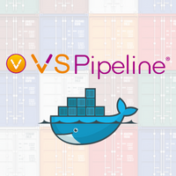…so we added some automation to your automation so you can automate while you automate! Automation has been a hot topic recently and for all the right reasons. As we (proudly) watch our customers increase their sample and data volume, we are constantly seeking to provide tools to reduce click rate and optimize throughput. Furthermore, with all of the new… Read more »
As a lab or group scales the number of NGS samples analyzed, it is important to automate the sample analysis pipeline from the sequencer to the point where it is ready for a variant scientist or lab personnel to follow the interpretation workflow and draft a clinical report. VSPipeline leverages the core VarSeq capability to create reproducible test-specific workflows through… Read more »
VSPipeline is becoming a very popular tool among VarSeq users as it is essential for creating repeatable clinical workflows that can be executed in automated fashion. Since VSPipeline is a command-line tool, I think it would be helpful to discuss some of the best practices along with helpful tips for getting the most out of VSPipeline. Some of you may be less familiar with VSPipeline, so I want to cover how to set up the first run along with sharing the helpful tips as they arise. … Read more »
VSPipeline is a command-line interface that will provide high throughput environments the ability to tap the full power of VarSeq’s algorithms and flexible project template system from any command-line context, including the existing bioinformatics pipeline. This feature is a great resource for analyzing large sample volumes as it automates importing and annotating your data, which can help streamline your analysis… Read more »
The power of VSPipeline is in it’s ability to automate VarSeq workflows. Using VarSeq to create a pipeline template is great because it allows you to dial in the applied filters as well as interactively organize the annotations and applied algorithms. Automating a workflow with VSPipeline is straightforward when beginning with an existing project. However, there are several steps that… Read more »
Today, we are proud to announce our collaboration with Fulgent Genetics, a CLIA certified molecular diagnostics lab. Fulgent offers more than 4,000 single gene tests among others and will implement VSPipeline to help speed up their analysis and interpretation process. On our quest to enable precision medicine, we look forward to working with Fulgent and other diagnostics labs in the… Read more »
Recently, Golden Helix, Inc. announced the addition of VSPipeline to our VarSeq software suite. VSPipeline is a command-line interface that will allow high throughput environments the ability to tap the full power of VarSeq’s algorithms and flexible project template system from any command line context, including existing bioinformatics pipeline. So, what is the big deal? Here are the top five… Read more »
Following up on our recent post about VSWarehouse 3’s Bring Your Own Cloud capabilities, we wanted to dive deeper into one of its most powerful features: our comprehensive workflow system. This system is designed to streamline genomic analysis pipelines while providing flexible integration with various cloud genomics providers. Understanding VSWarehouse 3 Workflows At its core, VSWarehouse 3’s workflow system is… Read more »
Optimizing sample throughput while maintaining quality control is, arguably, the crux of any profitable lab performing a high volume of analysis. We’ve discussed in great detail the flexibility of VSPipeline, our command line automation tool, as well as our full-stack FASTQ to report automation capabilities, and today I’d like to further elucidate on how QC methods fit into the picture…. Read more »
We are excited to participate in the European Human Genetics (ESHG) 2024 conference, where we will showcase our latest advancements in genetic analysis software. Attendees can visit Booth #428 to explore tools like VarSeq, VS-CNV, VSClinical, VSPipeline, and VSWarehouse. These solutions, aligned with ACMG and AMP Guidelines, offer powerful options for genomic analysis. Live demos will highlight our newest pharmacogenomics… Read more »
Variant curation is one of the most important aspects of a next-generation sequencing workflow. The routine application of previously rendered interpretations, paired with the ability to take into account evolving knowledge bases, allows clinical practices to rapidly and accurately provide life-saving results to patients. Hence, assessment catalogs, versatile databases that store variant interpretations for rapid access, form one of the… Read more »
There are many ways to optimize an individual workflow, from increasing the granularity of a filter chain to automating certain multi-stepped tasks. Although the best way to optimize an individual workflow is to book a session with our FAS team to talk about your unique use case, we wanted to highlight five ways a workflow can be optimized across most… Read more »
Thank you to all our viewers who attended our webcast last week on VarSeq 2.5.0: VSClinical AMP Workflow from the User Perspective. If you did not get a chance to attend but would still like to see the new upgrades to VarSeq 2.5.0, please visit our website here. Overall, this webcast highlighted the versatility of VarSeq, demonstrating both a Tumor-Normal… Read more »
Explore the Newest Developments in Variant Classification and Interpretation Tools at Booth 506 at ASHG 2023 Join Golden Helix at the American Society of Human Genetics (ASHG) 2023 conference and delve into the latest advancements in genetic research. This esteemed event brings together distinguished researchers, clinicians, and industry frontrunners to exchange knowledge on the most recent insights in human genetics…. Read more »
The ability to import patient-level information into VarSeq and VSClinical can not only save time while evaluating a sample but can be a critical step in automating project creation through VSPipeline. Here we will review how to construct a basic text manifest and how to apply that manifest to a project. Those fields can then be rendered into the final… Read more »
VarSeq 2.3.0 unleashed a whole new way to select, process, analyze, and report cancer variants through complete workflow automation, application of evaluation scripts, and enhanced annotation. Single nucleotide variants, copy number variants, structural variants, and genomic signatures could be added to a single patient evaluation, and Golden Helix CancerKB came packed with new report-ready interpretations to support them! Soon after,… Read more »
Greetings VarSeq users! VarSeq 2.4.0 has officially been released. VarSeq 2.4.0 is a significant release that focuses on enhancing the VSClinical ACMG workflow by introducing new features and noteworthy improvements. The major highlights of the release are: 1. Welcoming structural variant support to the VSClinical ACMG workflow 2. ACMG workflow automation has been enhanced via the application of evaluation scripts… Read more »
In our recent webcast, we discussed the exciting new features of VarSeq 2.4.0 and the updated VSClinical interface. The discussion was centered around three main topics: In summary, VarSeq 2.4.0 uniquely supports the analysis of all variant types in the clinical interpretation workflow. By incorporating structural variants, enhancing automation, and empowering users to handle complex data, it offers a comprehensive… Read more »
A new VSPipeline command, set_data_folder_path, designed to bolster consistent input usage. By introducing this innovative command, we aim to empower users with improved data organization, flexibility, and standardization for their clinical cases and analyses. Embracing this command will not only support reproducibility but also ensure accountability, ultimately paving the way for better-informed patient care decisions. Managing Annotations and References in… Read more »
Use the force of evaluation scripts to automate and customize your VSClinical ACMG workflow in VarSeq 2.4.0. VarSeq 2.3.0 came packed with new features! Most notably, VarSeq variant analysis expanded to support the import and annotation of structural variant files, and the AMP cancer workflow in VSClinical gained new functionality with the addition of evaluation scripts which help automate and… Read more »













